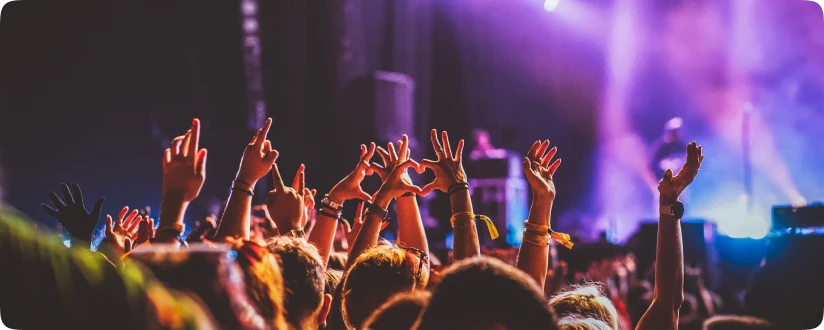Go back
Exploring the Cultural Significance of Popular Music Festivals

Music festivals bring people from around the world together to celebrate their shared love of music. From the iconic Woodstock to modern-day giants like Coachella and Tomorrowland, these festivals have grown beyond simple concerts. They've become cultural landmarks that shape trends, build communities, and make a lasting impact on society.
The evolution of festivals
Music festivals have a rich history filled with moments of rebellion and artistic expression. Woodstock in 1969 stands out as a key event, drawing hundreds of thousands looking to celebrate peace and love while protesting the Vietnam War. It set the stage for future events that would continue to push social and artistic boundaries.
As time went by, music festivals started to cater to a wider range of musical tastes. Electronic music festivals like Tomorrowland and Ultra Music Festival introduced vibrant energy and cutting-edge music. Meanwhile, rock, pop, and alternative music festivals like Glastonbury and Lollapalooza kept going strong, featuring both well-known artists and emerging talents.
Tech's big impact
Technology has revolutionized the festival experience. Today, you can livestream performances from anywhere in the world. Virtual reality allows you to experience the festival as if you were actually there. Cashless payment systems have simplified transactions, making the festival experience smoother and more convenient for attendees
The power of community and connection
When you think about music festivals, it's easy to focus on the big-name artists and electrifying performances. But what really makes these events special is the sense of community and connection they create. Music has a unique way of bringing people together, and festivals amplify that power, turning a crowd of strangers into a family of music lovers.
At a music festival, you're not just attending a concert; you're joining a vibrant community of people who share your love for the same sounds and rhythms. This shared passion creates instant connections. You might find yourself dancing with someone you've never met, bonding over a favorite song, or sharing stories with people from different walks of life. Music has this amazing power to unite us, showing us that we're all connected, even when we're different.
Music festivals are also a place where you can truly be yourself and feel like you belong. Whether you're dressed in your craziest outfit or singing at the top of your lungs, there's no judgment—just acceptance and celebration of individuality. This atmosphere of openness and inclusion fosters deep, lasting friendships. Many people leave festivals not just with memories of incredible performances but with new friends who feel like family. Whether you're attending your first festival or your tenth, you'll find that the sense of community is one of the most unforgettable parts of the experience.
Cultural exchange and social impact
Music festivals are like a big melting pot. They bring together people from all walks of life and foster cultural exchange. They provide platforms for international artists to showcase their music, helping people appreciate diverse musical styles. This exchange broadens perspectives and encourages understanding and tolerance among different cultures.
Beyond the music, festivals benefit communities in other ways. Music festivals are a big money-maker for local businesses. They bring in thousands of visitors who spend cash on food, hotels, and souvenirs. Many festivals also support social causes, raising awareness and funds for important issues.
A life-changing escape
In our fast-paced, stressful world, music festivals offer a much-needed escape. They give you a chance to let loose, express yourself, and connect with something greater than yourself. The joy and freedom found in music provide a refreshing break from mundane everyday life.